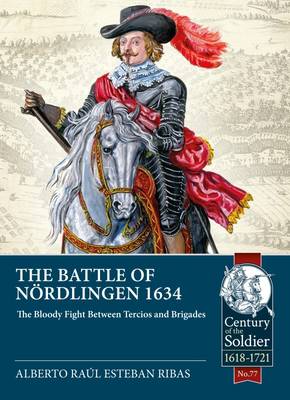
Door een staking bij bpost kan je online bestelling op dit moment iets langer onderweg zijn dan voorzien. Dringend iets nodig? Onze winkels ontvangen jou met open armen!
- Afhalen na 1 uur in een winkel met voorraad
- Gratis thuislevering in België vanaf € 30
- Ruim aanbod met 7 miljoen producten
Door een staking bij bpost kan je online bestelling op dit moment iets langer onderweg zijn dan voorzien. Dringend iets nodig? Onze winkels ontvangen jou met open armen!
- Afhalen na 1 uur in een winkel met voorraad
- Gratis thuislevering in België vanaf € 30
- Ruim aanbod met 7 miljoen producten
Zoeken
The Battle of Nördlingen 1634
The Bloody Fight Between Tercios and Brigades
Alberto Raúl Esteban Ribas
€ 34,95
+ 69 punten
Omschrijving
In 1634, the Thirty Years' War had taken a spectacular turn; the great protagonists of 1630 had died: King Gustav Adolf of Sweden and Generals Tilly and Wallenstein. The Swedish army was disoriented without the presence of its charismatic king. Chancellor Oxenstierna was to preserve his legacy, so the Heilbronn League was formed, with various Protestant states in western and northern Germany, and the French financial support.
With this, the Swedish-Protestants were able to launch various offensives throughout Germany, almost collapsing the Imperial forces, which were organizing even after the earthquake caused by the murder of Wallenstein. The King of Hungary Ferdinand, heir to the Holy Roman Empire, decided to assume command of the armies in the West and thus enhance his leadership.
Cardinal-Infante Fernando had been appointed governor of Flanders; but the sea voyage from Spain to Flanders was threatened by storms, the English, the French, and the Dutch. It was much safer to travel from Italy and travel more than 1,000 km through the so-called Spanish Road. But this route, which partly followed the course of the River Rhine, was now on the front lines of the Thirty Years' War. Prince Fernando could not travel alone, so an army of 10,000 soldiers was formed to escort him and then fight against Holland.
Ferdinand asked the Cardinal-Infante to help him conquer a small town, called Nördlingen, and together they could fight a Swedish-German army, commanded by Generals Gustav Horn and Bernard of Saxe-Weimar.
This book explains the general situation in Germany during the Thirty Years' War in the period 1633-1634. It describes in detail the tactics, armament and units of the Spanish, Swedish and Imperial armies. Analyze the conflicting interests of the various powers fighting the war.
The objective of the text is to explain the battle that took place in the plain of Nördlingen, the various protagonists who commanded the Tercios and Regiments that fought there; analyze the mistakes and successes of the generals. With all this, the stereotypes about the Spanish and Swedish tactical models are reviewed, which for a long time were the paradigm of tactics in European battle theaters. In this way, it seeks to answer which deployment was better, if the Swedish Brigades, or the Spanish Tercios.
With this, the Swedish-Protestants were able to launch various offensives throughout Germany, almost collapsing the Imperial forces, which were organizing even after the earthquake caused by the murder of Wallenstein. The King of Hungary Ferdinand, heir to the Holy Roman Empire, decided to assume command of the armies in the West and thus enhance his leadership.
Cardinal-Infante Fernando had been appointed governor of Flanders; but the sea voyage from Spain to Flanders was threatened by storms, the English, the French, and the Dutch. It was much safer to travel from Italy and travel more than 1,000 km through the so-called Spanish Road. But this route, which partly followed the course of the River Rhine, was now on the front lines of the Thirty Years' War. Prince Fernando could not travel alone, so an army of 10,000 soldiers was formed to escort him and then fight against Holland.
Ferdinand asked the Cardinal-Infante to help him conquer a small town, called Nördlingen, and together they could fight a Swedish-German army, commanded by Generals Gustav Horn and Bernard of Saxe-Weimar.
This book explains the general situation in Germany during the Thirty Years' War in the period 1633-1634. It describes in detail the tactics, armament and units of the Spanish, Swedish and Imperial armies. Analyze the conflicting interests of the various powers fighting the war.
The objective of the text is to explain the battle that took place in the plain of Nördlingen, the various protagonists who commanded the Tercios and Regiments that fought there; analyze the mistakes and successes of the generals. With all this, the stereotypes about the Spanish and Swedish tactical models are reviewed, which for a long time were the paradigm of tactics in European battle theaters. In this way, it seeks to answer which deployment was better, if the Swedish Brigades, or the Spanish Tercios.
Specificaties
Betrokkenen
- Auteur(s):
- Uitgeverij:
Inhoud
- Aantal bladzijden:
- 204
- Taal:
- Engels
- Reeks:
Eigenschappen
- Productcode (EAN):
- 9781914059735
- Verschijningsdatum:
- 4/11/2021
- Uitvoering:
- Paperback
- Formaat:
- Trade paperback (VS)
- Afmetingen:
- 180 mm x 246 mm
- Gewicht:
- 521 g

Alleen bij Standaard Boekhandel
+ 69 punten op je klantenkaart van Standaard Boekhandel
Beoordelingen
We publiceren alleen reviews die voldoen aan de voorwaarden voor reviews. Bekijk onze voorwaarden voor reviews.











